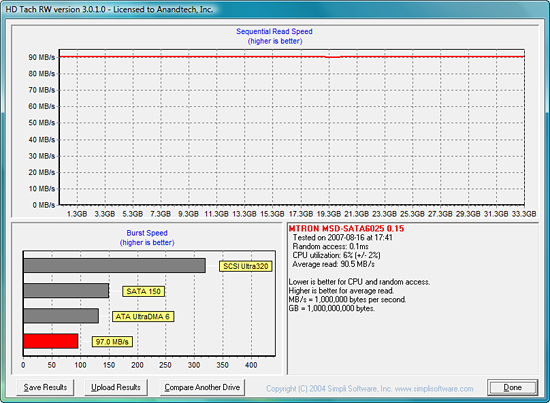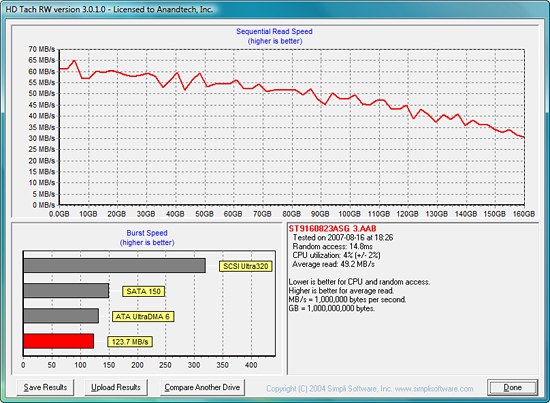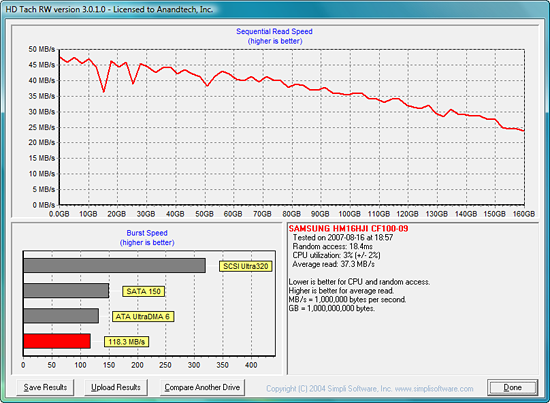HD Tach 3.0 Performance
MTRON 32GB SSD
Seagate Momentus 7200.2 160GB
Samsung MH80 FlashON 160GB
Our first screenshot is the MTRON drive and indicates a sustained transfer rate of 90.5 MB/sec with a burst rate of 97 MB/sec and a outstanding access time of 0.1ms or lower. The same drive on a Intel T7100 (1.8GHz) PM965/ICH8 platform scores a sustained transfer rate of 79.3 MB/sec with a burst rate of 82.5 MB/sec. The Intel controller is up to 14% slower with the MTRON SSD drive in this particular benchmark and follows the same pattern as the Intel desktop chipsets.
Our Seagate drive features sustained transfer rate of 49.2 MB/sec, burst rate of 123.7 MB/sec, and random access speed of 14.8ms. With a slower 5400rpm spindle speed, the Samsung drive provides a sustained transfer rate of 37.3 MB/sec, burst rate of 118.3 MB/sec, and random access speed of 18.4ms. While these numbers are significantly lower than the MTRON SSD, the performance differential in actual application benchmarks will be tempered somewhat by the platform components.
MTRON 32GB SSD
 |
| Click to enlarge |
Seagate Momentus 7200.2 160GB
 |
| Click to enlarge |
Samsung MH80 FlashON 160GB
 |
| Click to enlarge |
Our first screenshot is the MTRON drive and indicates a sustained transfer rate of 90.5 MB/sec with a burst rate of 97 MB/sec and a outstanding access time of 0.1ms or lower. The same drive on a Intel T7100 (1.8GHz) PM965/ICH8 platform scores a sustained transfer rate of 79.3 MB/sec with a burst rate of 82.5 MB/sec. The Intel controller is up to 14% slower with the MTRON SSD drive in this particular benchmark and follows the same pattern as the Intel desktop chipsets.
Our Seagate drive features sustained transfer rate of 49.2 MB/sec, burst rate of 123.7 MB/sec, and random access speed of 14.8ms. With a slower 5400rpm spindle speed, the Samsung drive provides a sustained transfer rate of 37.3 MB/sec, burst rate of 118.3 MB/sec, and random access speed of 18.4ms. While these numbers are significantly lower than the MTRON SSD, the performance differential in actual application benchmarks will be tempered somewhat by the platform components.










25 Comments
View All Comments
fc1204 - Monday, August 20, 2007 - link
well, the mtron uses a fpga as it's controller. they do what companies like adtron and stec (formerly simpletech) do to market ssd to clients- price is the concern after reliability and performance are satisfied.in the next year or two, you will start seeing asic controller-based ssd's. these will be more like the sandisk prices as opposed to the mtron prices.
on a side note, for those asking raid 0 ssd's, i need to comment that it will be harder to implement this in a viable consumer application because the price is just a bit more than the benefits- power-consumption and mobile-ruggedness (people have 600+watt psu's and cases that don't bounce while in operation) and laptops are replacing desktops in homes.
pqi has a ssd that is using raiding 2 cf controllers. we can always hope that anand gets more ssd's and crack them open.
DeepThought86 - Friday, August 17, 2007 - link
C'mon, we're all waiting for the RAID 0 results with these things!Spoelie - Sunday, August 19, 2007 - link
Actually a valid point, I'm wondering about possible problems in SSDs. Without the moving parts, reliability in RAID0 might make it more viable for desktop use.Are most of the defects predictable (i.e. this cell has been written to 1000 times and shouldn't be used anymore) and partly fixable (like having a table which designates broken cells, over time the capacity would go down then but no data lost, till it is replaced)?
Xenoterranos - Friday, August 17, 2007 - link
The HDD Tach chart for the SSD made me lol. Just seeing a flat line on a HDD performance chart makes me feel all warm and fuzzy inside.Spoelie - Sunday, August 19, 2007 - link
I thought someone died :(The other lines look more heatbeaty :D
Slaimus - Friday, August 17, 2007 - link
Who are they targetting with this insane price?brundlefly - Sunday, August 19, 2007 - link
MTRON isnt even marketing this to consumers - its a product generally sold for military and industrial use where shock and heat tolerances are high.However, I ordered it for a database drive, and it is actually one of the cheapest and simplest ways to improve the performance of disk i/o bound large tables.
Spoelie - Sunday, August 19, 2007 - link
If you read the previous article, you'd know, it's not meant for desktop use due to it's extremely rugged design;"The drive is marketed into the commercial, server, and industrial sectors with an emphasis placed on performance storage needs with a high degree of tolerance to environmental conditions."
i.e. specialized systems in low volume markets, not commoditized desktop systems.
Also, the other SSD's may be cheaper, but as also mentioned in the other article;
"These specifications far exceed those of the latest SanDisk and Samsung consumer SSD products that are approaching 67MB/sec read speeds and 45MB/sec write speeds"
You always pay a price for performance.
In conclusion, these articles are more of a future outlook on storage technology, not really about something regular joe will buy in a mom 'n pop store.
AnnihilatorX - Saturday, August 18, 2007 - link
I agree. SanDisk's 32GB is just $500Axbattler - Friday, August 17, 2007 - link
What is the cost of the Seagate and Samsung? It doesn't look like the inclusion of a relatively large Flash buffer is able to fully compensate for the slower rotational speed at all time. But it does edge the Seagate in a few instance leading me to think that if the cost premium is not too high, it is not unthinkable for traditional HD to 'evolve' into hybrids in next couple of years. A hybrid version of a Raptor should be quite interesting.SSD is looking very good here, but even with significant price decrease each year, I do not see those become 'mainstream' for quite some time. Increasingly affordable for the enthusiasts (desktop), and flagship/customised high end laptop sure. But we are not going to see those in every HP/Dell desktop (or even laptop) for quite some time IMO. Then again, have other HD manufacturers (WD, Hitachi, Seagate) announced their own plans for hybrids?